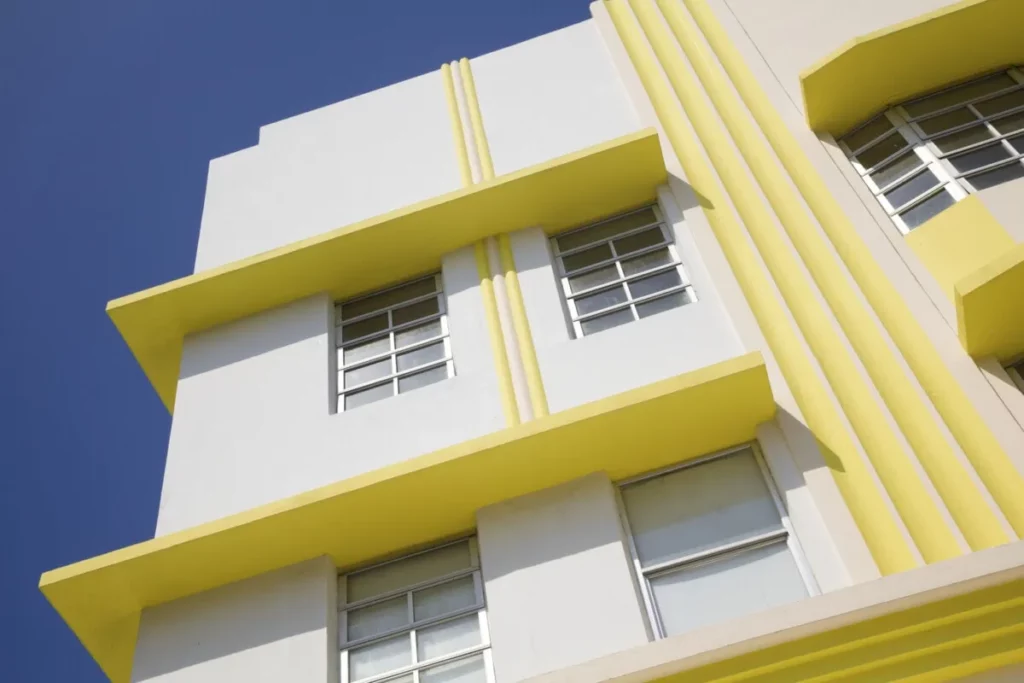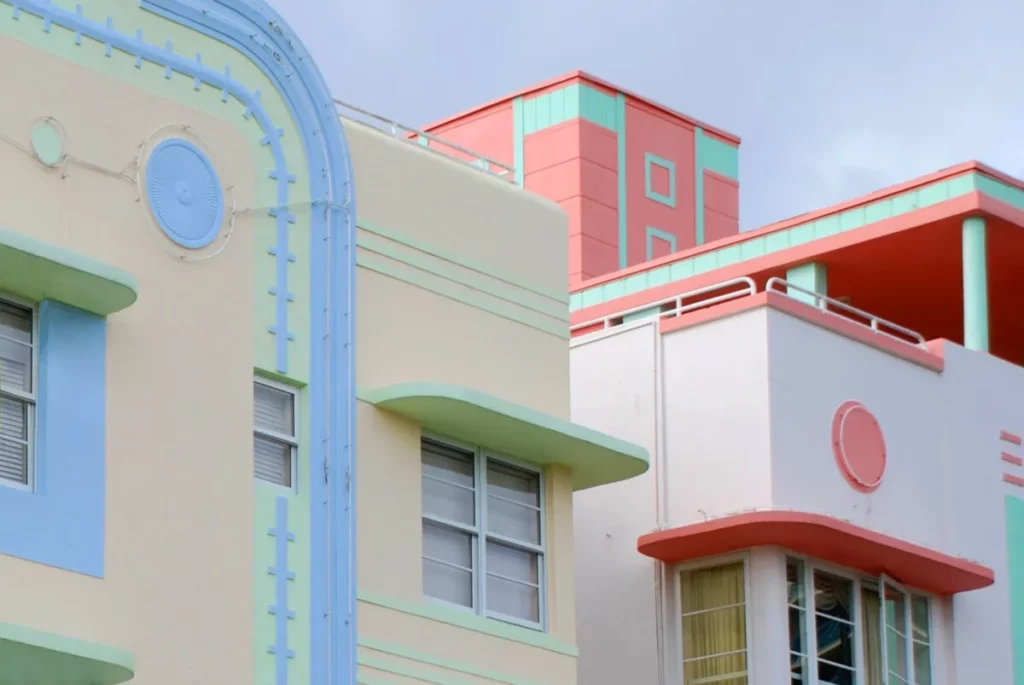Article by: Marissa Crum
Reading Time: 6 minutes
Art Deco, a design movement that emerged in the early 20th century, has left an indelible mark on architecture, interior design, and the decorative arts. Among its most notable contributions are the iconic Art Deco homes, characterized by their distinctive geometric shapes, sleek lines, and luxurious details.
In this Redfin article, (see original here)we will delve into the fascinating world of Art Deco houses, exploring their history, unique features, and providing inspiring examples. Whether you’re an architecture enthusiast searching for vintage homes in Los Angeles, or a homeowner seeking design inspiration in New York, join us as we delve into the world of these architectural masterpieces.

Historical context
Let’s begin by diving into the historical context of Art Deco homes. The Art Deco movement emerged in the 1920s and 1930s, a period characterized by rapid technological advancements and a desire for modernity. As a response to the ornate and elaborate styles of the preceding Art Nouveau and Victorian eras, Art Deco embraced streamlined simplicity and geometric forms. This aesthetic shift was mirrored in architecture, leading to the rise of Art Deco homes as symbols of modern living.
“To honor the true character of the Art Deco style in your home, it is important to understand its background and significance,” notes real estate writer Real Copy Right. “While maintaining modern necessities can be challenging, it is worth the effort to uncover the captivating charm of Art Deco.”
Distinctive features of Art Deco homes
Art Deco houses possess a range of distinctive features that set them apart from other architectural styles. Let’s explore some key elements.
1. Geometric shapes
Art Deco embraces bold, symmetrical geometric forms, often incorporating zigzags, chevrons, and sunburst motifs. These shapes are prominently featured in windows, doorways, and decorative elements, lending a sense of dynamism and visual interest to the exteriors.
“To create an authentic Art Deco ambiance in your home, pay attention to the power of accessories,” mentions DIY Home Comfort. “Art Deco-inspired accessories play a vital role in capturing the era’s opulence and drama. Seek out vintage or reproduction pieces with bold geometric patterns, metallic accents, and luxurious materials. Incorporate mirrored and metallic accents to infuse a touch of glamour. Thoughtfully place these accessories to set the desired ambiance, enabling you to adapt the mood for various occasions. With careful selection and arrangement of Art Deco-inspired accessories, you can effortlessly evoke the timeless elegance and sophistication of the Art Deco style.”
2. Smooth facades
Art Deco homes showcase smooth, flat facades devoid of excessive ornamentation. Walls are typically rendered in stucco or plaster, resulting in a clean and streamlined appearance that exudes elegance and sophistication.
3. Porthole windows
Circular or semicircular windows resembling ship portholes are a common Art Deco feature. These windows not only add a touch of whimsy, but also allow ample natural light to flood the interiors, creating bright and airy living spaces.
“Lighting plays a crucial role, with elaborate chandeliers and sleek table lamps boasting intricate metalwork and geometric patterns,” shares TAPIS Studio. “These fixtures not only serve a functional purpose, but also add warmth and charm to the space, enhancing the overall aesthetic of the Art Deco style.”
4. Dramatic entrances
Art Deco entrances are grand and often feature elaborate door surrounds, flanked by decorative motifs such as stylized flora or abstract designs. These entrances serve as focal points, welcoming guests with a sense of grandeur and style.
5. Luxurious materials
Art Deco embraces opulence and frequently employs luxurious materials such as marble, chrome, glass, and exotic woods. These materials add a touch of glamour and refinement to Art Deco homes, creating a sumptuous living environment.
“Art Deco homes offer a captivating canvas for homeowners to express their creativity and embrace the opulence of the past,” expresses Harbor Art Supplies. “Embrace the luxurious materials that define this iconic style. Incorporate vibrant color palettes reminiscent of the Jazz Age, and adorn your space with carefully selected art pieces and decorative accents that pay homage to the era. Let your home become a living work of art, where every detail tells a story of timeless elegance and artistic flair.”
Examples of Art Deco homes from around the world
Now, let’s delve into some inspiring examples of Art Deco homes around the world.
1. The Chrysler Building in New York City
This iconic skyscraper, completed in 1930, stands as a testament to Art Deco architecture. Its gleaming stainless-steel spire, intricate detailing, and geometric patterns make it a true masterpiece, capturing the essence of the Art Deco era.
2. Eltham Palace in London
A striking blend of Art Deco and medieval architecture, Eltham Palace showcases sleek lines, bold colors, and luxurious interiors. It perfectly embodies the elegance and glamour of the Art Deco era while providing a fascinating juxtaposition of styles.

3. The entire city of Napier in New Zealand
Following a devastating earthquake in 1931, the city of Napier was entirely rebuilt in the Art Deco style. Today, Napier is hailed as the Art Deco capital of the world, boasting streets lined with beautifully restored Art Deco buildings. A visit to this vibrant city is like stepping back in time.
4. The Atlantis House in Miami Beach
Located in the heart of the famous Art Deco Historic District, the Atlantis House is a lavish residence that exemplifies Art Deco elements. From its porthole windows to its sleek curves, this house radiates the allure and charm of Art Deco architecture.
Tips for buying and restoring an Art Deco house
If you’ve fallen in love with the allure of Art Deco homes and are considering purchasing or restoring one, here are some essential considerations.
1. Research and location
Begin by researching Art Deco properties in your desired location. Look for neighborhoods or cities known for their Art Deco architecture, such as Miami Beach, New York City, Los Angeles, and Chicago, as these areas may have a higher concentration of potential houses to choose from. Consider factors such as proximity to amenities, transportation, and the overall neighborhood ambiance.
2. Engage professionals
When purchasing or restoring an Art Deco house, it’s crucial to engage professionals who specialize in Art Deco architecture and restoration. Hire a reputable real estate agent who understands your passion for Art Deco and can guide you in finding the right property. Additionally, consult with architects, designers, and contractors experienced in Art Deco restoration to ensure that the authenticity and integrity of the house are maintained throughout the process.
“To preserve the integrity of your home’s interior features, such as the Art Deco wood paneling, it is essential to work with a technician who specializes in antique homes and understands their unique requirements,” claims Design Baddie. ‘Their expertise will ensure that the wiring is replaced without causing any damage or disruption to the cherished elements of your Art Deco home.”
3. Preservation and authenticity
Preserving the original features and character of an Art Deco house is essential for maintaining its historical and architectural value. Pay attention to elements such as door frames, windows, flooring, light fixtures, and decorative details. Whenever possible, restore or repair original features rather than replacing them. This will ensure that the house retains its authentic Art Deco charm.
“Art Deco homes require careful maintenance to preserve their original features and historic value. Prioritize the preservation of ornate elements and be prepared for refurbishment as needed,” points out Historic Phoenix Homes. “Regular maintenance of intricate details, such as ornate floorings and tiles, is crucial for their longevity and visual appeal. Ensure proper sealing for decorative glass, windows, and mirrors. Consider the delicate nature of these pieces, especially in households with active children or pets. Additionally, conduct thorough inspections of flat roofs, which are common in Art Deco homes, to address any cracking or potential leaks and ensure their structural integrity.”
4. Modernization and practicality
While maintaining the integrity of an Art Deco house is important, it is also crucial to consider modern comforts and practicality. Upgrading the plumbing, electrical systems, and insulation will enhance the functionality of the house without compromising its architectural integrity. Aim for a balance between preserving the past and incorporating contemporary conveniences.
5. Design and décor
“To achieve an Art Deco-inspired decor, incorporate a bold and glamorous color palette, such as deep blues, emeralds, vibrant reds, and touches of gold or dark brown,” states Reflections Copenhagen | Mirror & Crystal Décor. “Embrace symmetrical designs, zigzags, and curved lines through wallpapers, rugs, or fabrics. Choose sleek furniture and accessories with smooth curves, using luxurious materials like lacquered wood, mirrored surfaces, chrome, and crystal. Make statement pieces the focal point of the room and complete the look with Art Deco-inspired accessories like glassware and cocktail trays featuring stylish geometric shapes and colors. Remember, Art Deco decor combines elegance, luxury, and boldness in a harmonious balance throughout your space.”

6. Preservation codes and regulations
Ensure that you are aware of any preservation codes or regulations that apply to Art Deco houses in your area. These regulations may dictate specific guidelines for restoration, including materials, colors, and architectural elements. Familiarize yourself with these guidelines to ensure compliance and avoid any potential conflicts during the restoration process.
7. Community engagement
Join local preservation societies or historical organizations dedicated to the conservation of Art Deco architecture. These groups can provide valuable resources, guidance, and a network of like-minded individuals passionate about preserving and restoring Art Deco homes. Participating in community events and tours can also deepen your appreciation for the Art Deco style and allow you to connect with fellow enthusiasts.






